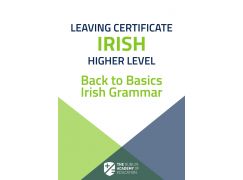Should I Do Higher Level Irish
Many students are still unsure if they should do higher level Irish.
In this article I will address many of the common questions and concerns students bring to me on a yearly basis regarding higher level Irish and hopefully help you decide whether to take HL Irish or not.
Should I Take Higher Level Irish?
Hi guys, my names Séadhan and I’m the higher-level Irish teacher here at The Dublin Academy of Education. I’m going to do my best to describe what it’s like to be a higher-level student studying Irish for the leaving cert and answer some of the common questions I get every year.
Let’s start out by discussing some of the benefits of studying higher level Irish. As with any higher-level subject, there are more points available to students in comparison to ordinary level courses. The ability to speak any second language is valuable to employers and students often over-look Irish in this regard. There is a role for Irish in many of the top industries today, for example I have friends who are lawyers who often send me documents in Irish if they need help understanding what’s being said. If you think you’d like to go down the teaching or lecturing route, then having the ability to speak Irish can open up numerous opportunities for you both in Ireland and abroad.
How Does It Compare To Other Subjects?
Regarding the exam material, it compares quite favourably to other subjects once you begin to break it down. Take the poetry section of the exam for example. There are a total of five Irish poems in the entire course. If you look at English, there might be five poems to learn for just one poet! Aside from the essay section, you end up knowing most of the material that will be coming up in the exam which can lead to far less problem solving on the day.
Am I Good Enough To Take Higher Level Irish?
Many students question their ability to do higher level Irish, thinking to themselves ‘am I really good enough to do this?’ Ultimately, If you’re going to do higher level Irish, you must have the willingness to work hard. Getting a good grade is very achievable if you’re willing to go the extra mile and take instruction from your teachers.
Consistency is the key to success in higher level Irish. Eighty of the possible one-hundred marks on paper one are for your spelling, grammar and general standard of your Irish. Use the resources your teachers give you for writing your Irish essay and don’t throw any test straight into the bin, regardless of how well or poorly you may have done. It’s imperative that you constantly ask questions and continually look to improve on everything you write throughout the two-year leaving cert cycle. That way you will ensure you have the best chance to get as many of those 80 points as you can.
It may sound trivial but if you approach higher level Irish with a defeatist attitude then don’t bother. I’ve heard many students say that they won’t need to use Irish after the leaving cert. That should not a driving factor in deciding whether to do higher level or not. Most students will never draw another geography map outside of school and yet nobody seems to mention that possibility nearly as much!
Irish Oral Breakdown:
Preparing for your Irish oral can seem daunting to many students, so its vitally important to break it down into manageable sections.
The oral consists of four main parts:
The welcome (Failtiú) where you introduce yourself to the examiner stating your name, age, birthday, address and exam number. This is always learnt off well in advance of the oral and can be a real nerve settler for many, not to mention possibly the easiest 5 marks you’ll be able to get in any subject.
Poetry reading (Filíocht le Léamh) where the examiner will ask you to read out one of five poems you will learn throughout the year with an emphasis on your pronunciation
Picture Stories (Sraith Pictiúr) where you’ll be asked to talk about one of 20 possible picture sequences in as much detail as you can. After speaking about each picture, you get the chance to ‘turn the tables’ so to speak on your examiner and ask them 3 questions about the Sraith Pictiúr after which they’ll ask 3 questions about the pictures in return.
Conversation (Comhrá) is the final part of the oral. It’s a chance to show off how well you can speak the language and a great opportunity to use some of the words/phrases you’ll have learnt throughout the leaving cert cycle. This could be the last time you speak this much Irish in one conversation, something the examiners are acutely aware of, so they’ll do their best to make it a positive experience.
Common Myth’s About Higher Level Irish:
One of the most common ‘myths’ I hear is that the Irish oral is too hard, or the questions asked are too difficult. As someone who has been a state examiner for Irish orals for multiple years, I can assure you that the person testing you is on your side and is not fixated on asking you difficult questions just to try and trip you up. The best way I can describe it would be to think of a swimming pool. You start in the shallow end, with relatively easy questions to ease you into the conversation. With each question you get progressively deeper and if the examiner starts to feel that you’re struggling, they will ask an easier question to pull you back up.
Don’t panic if you feel like you’re being asked difficult questions, its usually a good sign that the examiner feels you are capable enough to answer them. Their ultimate job is to assess what category you fall into (H1, H2, H3 etc…) and they’ll try everything to get you into a higher one if possible. So, remember, the examiner is on your side and trying to award you as many points as they can!
Studying for the Irish aural is all about practicing as much as possible. You’ll come to find out that certain works come up in multiple different listening comprehensions all the time and can be useful in helping you prepare for the exam.
Paper two consists of 5 written questions, 2 reading comprehensions, Prós, Poetry and a question on extra literature. The paper can be tough due to the time pressure your under to finish everything while also showing off your Irish as much as possible. Throughout the leaving cert cycle I consistently test students by having them do exercises under similar time pressure to help them gauge what it will feel like during the exam. Whether it’s with your teacher, friends or by yourself it’s important to time yourself every so often to make sure you can deliver as much detail as possible within a given time frame.
How To Get Organised For Higher Level Irish:
Something I’m asked about constantly at the start of the school year is how do I get organised for Irish. There are three main areas to focus on, your essay, your Irish oral and your reading comprehensions. The essays take the longest to learn. It’s three pages long and there are no other questions on the paper which come close to that length. Don’t wait till after Christmas to start writing out your essays. Get them done from October to December, written out on paper and learn them consistently week by week. Don’t start seriously testing yourself on the material till after Christmas so you’ve time to learn as much as possible beforehand. Examiners notice the richness of the language you use, and this takes time to perfect.
Finally, try and get started as soon as possible preparing for your Irish exam. Get the harder material out of the way first so you have the material in front of you to revise. Speak as much Irish as possible to help prepare yourself for the oral exam. I often do three practice orals in 5th year and six practice orals in 6th year for my students to help them stay focused on studying Irish. If you can get a friend or classmate to converse with once or twice a week to help go over what you’re studying, it can be an invaluable resource.
Remember above all else, consistency is key to succeeding at higher level Irish. Its far more beneficial to do 20 minutes every day than a 1-2 hour session every Saturday!
Related Products
 Irish€ --.
Irish€ --.

